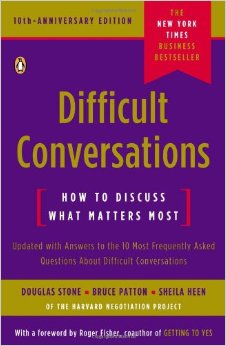 Relationships — social, marital, parental, professional — cause a lot of pain for ADHD adults.
Relationships — social, marital, parental, professional — cause a lot of pain for ADHD adults.
Though it’s only one part of the struggle, most of us could use some serious help in the communication department.
Difficult Conversations: How to Discuss What Matters Most, by
Difficult Conversations separates readers from our own narrative and reveals the reasons underlying others’ hot-headed — and often baffling — reactions.
This is especially helpful because ADHD’ers tend to communicate in the language of high drama: accusations, assumptions, black-and-white thinking, and runaway emotions. I found the section about personal identities particularly helpful. It’s easy for ADHD adults to fall into defensive or blame-shifting behaviors because owning our failures is so painful. This is critical to remember when discussing tender subjects. Our identities as loving spouses, dedicated parents, or responsible adults can easily feel under attack.
ADHD adults who tend toward the impulsive and over-emotional may find Difficult Conversations particularly instructive. The authors go far beyond the too-common — and generally unhelpful — “think before you speak.” We learn that sharing feelings productively is vital to healthy relationships — and when we do it well, it needn’t be messy or destructive.
Buyer beware, though: this isn’t the only book you’ll ever need to go happily on your way to communication mastery. Difficult Conversations provides a solid foundation to understand what contributes to communication meltdowns. It won’t help you use the skills in real time or, most important, widen the gap between stimulus and response. To be successful, you’ll need to recognize and inhibit knee-jerk reactions before they leave your mouth. You’ll also need to remember your new communication skills in the moment. This is easier said that done.
As a result, I experienced a lot of frustration as I read Difficult Conversations. Every chapter feels like well-articulated common sense, which makes the difficulty of implementation all the more demoralizing. ADHD adults embarking on this journey will need a partner willing to endure a lot of practice, reflection, and setbacks. I also suspect most of us will need stimulant medication to experience the full potential benefit of Difficult Conversations. Otherwise, the cognitive resources required to apply all this new knowledge in the heat of the moment will be too great.
Do you have a similar book to recommend? I’m always looking for new titles to read and review, so send your suggestions my way in the comments.
Hey there! Are you enjoying The ADHD Homestead?
Here's the thing: I don't like ads. I don't want to sell your attention to an advertising service run by the world's biggest data mining company. I also value my integrity and my readers' trust above all, which means I accept very few sponsorships/partnerships.
So I'm asking for your support directly. For the cost of one cup of coffee, you can help keep this site unbiased and ad-free.
Below you will find two buttons. The first lets you join our crew of Patreon pals and pledge monthly support for my work. Patrons also have access to my Audioblogs podcast. The second takes you to a simple donation page to pledge one-time or recurring support for The ADHD Homestead, no frills, no strings. Do whichever feels best for you!

